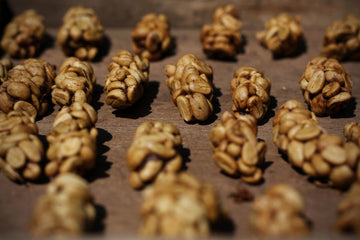
Kopi Luwak, also known as civet coffee, is a type of coffee that has been gaining popularity in recent years due to its unique flavor profile and reputation as a rare and luxurious product. But does it live up to the hype? In this article, we'll explore the history of kopi luwak, how it's made, and whether or not it's worth the high price tag.
A Brief Background

Kopi luwak is made from coffee beans that have been eaten and excreted by a civet, a small mammal native to Southeast Asia. The civets are said to have a natural taste for the sweetest and ripest coffee cherries, and the digestive process is believed to add unique flavors to the beans. The beans are collected from the feces of the civets, cleaned, and then roasted to make the final product.
Why is It so Expensive?
One of the reasons kopi luwak is so expensive is due to the limited supply. It's estimated that only around 500-600 kilograms of kopi luwak are produced each year, making it one of the rarest coffees in the world. Furthermore, the process of collecting the beans from the civets can be labor-intensive and time-consuming, adding to the cost.

Another factor contributing to the high price of kopi luwak is the unique flavor it possesses. The coffee beans are said to have a rich, smooth, and slightly sweet taste with hints of chocolate and nuttiness. This flavor profile is attributed to the fermentation process that occurs as the beans pass through the digestive system of the civet. The digestive enzymes of the civet break down the protein found in the coffee beans, which results in a milder, less bitter taste. The rarity and unique taste of kopi luwak have led to it becoming a highly sought-after coffee, driving up the price. Despite its high cost, many coffee connoisseurs believe that kopi luwak is worth the investment due to its rich flavor and unique production process.
So, does kopi luwak live up to the hype?
The answer to this question depends on who you ask. Some coffee connoisseurs swear by the unique flavor profile of kopi luwak, which is said to have notes of chocolate, caramel, and nuttiness, with a smooth and rich finish. However, others argue that the flavors are not significantly different from other high-quality coffees and that the high price tag is not justified.

One of the biggest controversies surrounding kopi luwak is the ethics of using civets for coffee production. Some animal rights activists argue that the conditions in which the civets are kept can be cruel and inhumane, and that the animals are often force-fed coffee cherries in order to increase production. As a result, some consumers choose to avoid kopi luwak for ethical reasons.
---
Whether or not kopi luwak lives up to the hype is a matter of personal opinion. For coffee aficionados who appreciate unique flavors and are willing to pay a premium for a rare product, kopi luwak may be worth trying. However, for those who are concerned about the ethics of using civets for coffee production, or who prefer to stick to more conventional and affordable coffee varieties, kopi luwak may not be the right choice. Ultimately, the decision to try kopi luwak or not comes down to personal preference and priorities.




